#India-Pakistan relations
Explore tagged Tumblr posts
Text
Debate Over Sohaib Chaudhary's Praise for India
In recent days, YouTube Sohaib Chaudhary has come under fire in Pakistan. He is known for his popular channel Real Entertainment TV. The criticism started after he publicly praised India’s achievements. His admiration for India’s technological and economic progress sparked outrage among critics who accused him of being disloyal. The controversy deepened. Abid Ali, another Pakistani YouTuber and…
#Contemporary Issues#Cross-Border Influence#Cultural Commentary#Digital Media#India-Pakistan Relations#Political Commentary#Social Media Trends#YouTube Influencers
0 notes
Text
The Nehru-Liaquat Pact: A Comprehensive Analysis of Successes, Failures, and its Impact on India-Pakistan Relations
The Nehru-Liaquat Pact: Origins, Objectives, Successes, and Failures Over the Decades The Nehru-Liaquat Pact, also known as the Delhi Agreement, stands as a critical moment in the turbulent post-Partition era of South Asia. Signed on April 8, 1950, by Indian Prime Minister Jawaharlal Nehru and Pakistani Prime Minister Liaquat Ali Khan, this agreement was an attempt to address the communal…
#Communal Violence#Delhi Agreement 1950#India-Pakistan Relations#Indo-Pak History#Jawaharlal Nehru#Liaquat Ali Khan#Minority Rights#Nehru-Liaquat Pact#Partition of India#Refugee Crisis
0 notes
Text
Everything is in the manifesto: Farooq Abdullah on diplomatic initiatives between India and Pakistan
PULWAMA — Former Jammu and Kashmir Chief Minister Farooq Abdullah said on Tuesday that the Congress-National Conference alliance will get success in the upcoming assembly polls. When asked if his party, if elected, would push the Centre to resume talks with Pakistan, Farooq responded, “Sab manifesto mein hai…” (everything is in the manifesto). “This time, people are in a very good mood. The…
#Assembly Election#Farooq Abdullah#India-Pakistan Relations#Jammu and Kashmir (J&K)#National Conference (NC)#Politics
0 notes
Text

“Kasuri also gives us a rare insight into the minds of the Pakistan Army, the contribution of the Foreign Office and his warm but complex relationship with President Musharraf. Blending analysis with choice anecdote, Neither a Hawk nor a Dove gives us a comprehensive and revealing account of Pakistan’s politics and the political compulsions of those at the helm.” 🌱
#khurshid mahmud kasuri#neither a hawk nor a dove#viking books#nonfiction#pakistan#foreign policy#diplomacy#india#indo pak#india pakistan#kashmir#kodak#south asia#dark academia#light academia#dark acadamia aesthetic#light acadamia aesthetic#studyblr#booklr#vintage#thrift#old books#second hand#political science#international relations#poli sci#mine#chai#study blog#book blog
15 notes
·
View notes
Text
cheating on your partner is not funny and I’m not a fan, but the way they’ve actually caused ethical debate, got people discussing geopolitical ramifications and just generally inflicting minus 10 cultural relations….anyway my condolences to the victim. hope you find peace and love x

#bro they were so close to winning the whole thing#like you overcome multiple political religious and national barriers with your relationship…..and for why#for the people who have jobs and don’t know or care ——#the one on the right cheated on the one on the left WEEKS before their wedding#and they’re both like ‘influencers’ or whatever#anyway they put out statements or something on instagram (?) confirming they broke up because of cheating#and it’s got people saying a lot of mad stuff#about cheating#about religion#about the generally hostile relations between india and pakistan#about sexuality#whatever take you can think of — it’s there#and again it’s NOT funny and I don’t really know or care about who they are#but the fact it had kind of a wide reach and caused so much discussion on Twitter#is….interesting#it’s time to ban both Twitter and influencers btw
5 notes
·
View notes
Text
coke studio afreen afreen
#send tweet hit post whatever#what was that post that was like afreen afreen did more for india pakistan relations than literally anything else
4 notes
·
View notes
Text
India’s Geopolitical Challenge: The China-Pakistan-Bangladesh
India’s Geopolitical Challenge India has long been watchful of its geopolitical neighborhood, but recent developments suggest a growing challenge in the form of a China-Pakistan-Bangladesh troika. Turbulence in Bangladesh, the increasing influence of Pakistan, and China’s strategic investments in the region have raised concerns about India’s security and economic interests. As political…
0 notes
Text
How India Redefined Sovereignty: Article 370’s Legacy in Kashmir
In the grand theater of global politics, the United Nations has long been viewed as a custodian of peace and a mediator in conflicts. But in Kashmir, the abrogation of Article 370 marked the beginning of an era where India decisively turned the page on international arbitration, casting the UN into the shadows of irrelevance. For decades, the United Nations Military Observer Group in India and Pakistan (UNMOGIP) lingered in Srinagar, a relic of Cold War politics that time had outgrown, but it was the abrogation that delivered the final verdict: its purpose was obsolete. Expand to read more
#Article 370 abrogation#Kashmir sovereignty#India UN relations#UNMOGIP relevance#geopolitics of Kashmir#India Pakistan conflict#Article 370 impact#Kashmir integration#global politics#Indian sovereignty#Insightfultake on article 370.
1 note
·
View note
Text
Review of Pallavi Raghavan’s Animosity at Bay: An Alternative History of India-Pakistan Relationship, 1947-1952
The story of India-Pakistan relations has often been told as one of hatred—the animosity often nurtured prior to the partition and its aftermath. It is argued that the woes of the bloody partition, which culminated in the massacre of over a million people and displacement of over another ten million across borders, continue to haunt the two postcolonial nations. And in that sense, added to other…
#an alternative history of india-pakistan relationship#Book Review#books on India-pakistan relations#india pakistan relations#india-pakistan relations books#pallavi raghavan#Pallavi Raghavan books#pallavi raghavan&039;s animosity at bay#raghavan&039;s book review
0 notes
Text
Indian FM Declares End of "Uninterrupted Dialogue" Era with Pakistan
India’s External Affairs Minister, Subrahmanyam Jaishankar, declared on Friday that the era of “uninterrupted dialogue” with Pakistan has ended, signaling a firm stance in New Delhi’s approach to its western neighbor. Speaking at a private event, Jaishankar emphasized that India will respond to developments “whether positive or negative,” underscoring the country’s proactive posture.“So far as…
0 notes
Text
Unraveling India’s BRICS and BRI Conundrum
In a world where geopolitics often resembles a complex game of 3D chess, India finds itself pondering its next move on a board set by two ambitious projects – the expansion of BRICS and China’s Belt and Road Initiative (BRI). Imagine a chessboard, not with mere black and white squares, but a vibrant mosaic of global interests, strategic rivalries, and the occasional pawn aspiring to be a queen.…
youtube
View On WordPress
#2023#BRICS expansion#China&039;s Belt and Road Initiative#diplomatic challenges#economic alliances#economic corridors#emerging economies#geopolitical chess game#geopolitical irony#Geopolitics#global power dynamics#Global-Strategy#India&039;s-Foreign-Policy#India-BRICS relations#India-China rivalry#Indo-Pacific affairs#infrastructure development#international diplomacy#multipolar world order#Pakistan-BRICS membership#regional influence#sovereignty concerns#strategic-partnerships#Youtube
0 notes
Text
Taliban's Chitral River Dam: Unraveling Regional Water Security and Relations in South and Central Asia
Taliban's Chitral River Dam: Unraveling Regional Water Security and Relations in South and Central Asia #TalibanDam #WaterSecurity #Geopolitics #ChitralRiver #KunarRiver #Diplomacy #RegionalRelations #SouthAsia #CentralAsia #IndusWatersTreaty #Taliban
The very essence of South Asia and Central Asia’s water security pivots on the lifeblood provided by transboundary rivers such as the Indus, the Ganges, the Brahmaputra, and the Amu Darya. These vital arteries sustain the lives, livelihoods, and ecological equilibrium of millions across Afghanistan, Pakistan, India, China, Nepal, Bangladesh, Tajikistan, Uzbekistan, Turkmenistan, and Kazakhstan.…
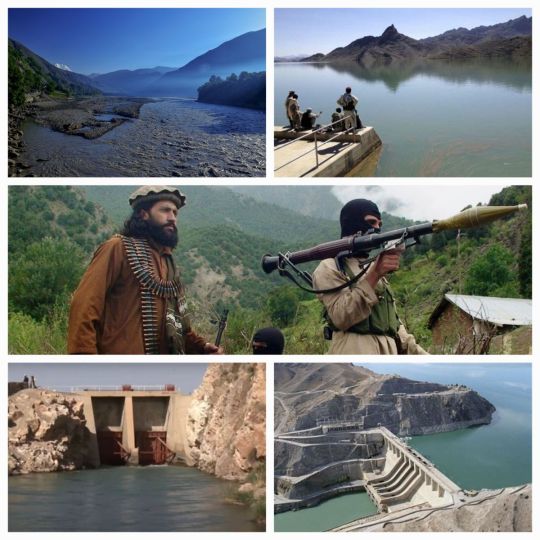
View On WordPress
#Afghanistan#Chitral River#Diplomacy#Energy Security#Geopolitics#Hydroengineering#India#Indus Waters Treaty#Kunar River#Pakistan#Regional Cooperation#Regional Relations#Regional Stability#Taliban#Transboundary Rivers#Water Security
0 notes
Text
Trending News India wants normal neighbourly relations with Pakistan but Islamabad is yet to show sincerity: MEA
Image Source : PTI/FACEBOOK Pakistan Prime Minister Shehbaz Sharif and his Indian counterpart Narendra Modi. There is no let-up in Pakistan-sponsored cross-border terrorism and Islamabad is yet to show sincerity in delivering justice to the families of the victims of the 26/11 Mumbai terror attacks, the Ministry of External Affairs (MEA) said in a report on Monday. In its annual report for 2022,…

View On WordPress
#India#India PAKISTAN news#India Pakistan relations#India relations with Pakistan#pakistan#PM Modi#PM Modi on Pakistan#Shehbaz Sharif
0 notes
Text
Another 'wonderful news' from Russia for your consideration! This week, the BRICS forum on traditional values took place in Moscow. And it was fucking insane.
In short, the opening meeting was BRICS countries representatives verbally jerking off on how well they oppress or plan to oppress their people especially women. The only person who bothered to contradict this narrative was Egyptian female writer Doha Mustafa Assy.
I will translate some quotes from the russian article. https://www.kommersant.ru/doc/7311174
Russia: "At some point the roles for women have begun to change towards independence and self-sufficiency. We, of course, love and respect our women very much, but we want them to pay more attention to their families, men and children. We do not want them to strive for business, politics, economics, power, or culture. <...> The main traditional value is the preservation of natural purpose, where a woman continues the family line and a man inspires her to give birth to children."
Pakistan: "Any traditional religion upholds and promotes social values and traditions. No father would want to harm his family. No mother would want to break up or disintegrate her family. This <rejection of family values> is deliberately imposed on us and promoted by some power circles”
Ethiopia: "In our country it is traditionally women who do the cooking, teaching children and other family duties. So the man's role is not as big as the woman's, and this tradition gives the man the freedom to behave like a child." (?????)
Uganda: [This country experience is “extremely important to the discussion of legislative protection of religious values,” emphasized russian politician Dmitry Kuznetsov, referring to the fact that in Uganda same-sex relations are prohibited, and in some cases violators face life imprisonment or even the death penalty.] “We did this to make sure that the country would be preserved. I would encourage countries to behave in such a way that the culture that exists in each country is not imposed on others.” btw Brazil and South Africa representatives didn't say a word here even though their countries legalized same-sex mafrriage years ago.
Brazil: "Marriage in no longer a goal for our citizens and the country has the highest divorce rate in history. Meanwhile, children are most often left with their mothers, with fathers unwilling to take part in their upbringing. As a result, many Brazilian boys are growing up without a father figure and 9% of male inmates in prisons don't even know their father's name. Shifting the balance in favor of women leads to the fact that the position of feminism is growing, and the number of people who identify as LGBT people is growing.” At the end of his speech, he marveled, “This is my first time in Russia, and I didn't know you guys were so conservative. I'm so happy, it's so impressive!” He also admitted that “the people of Brazil know nothing about Russia,” and Dmitry Kuznetsov promised: “We will come to you and tell you all about our saving conservatism.”
Egypt: As I mentioned in the beginning the only person who actively argued against this trend was Doha Mustafa Assy. She said: "We on the contrary has a struggle against patriarchy. Tradition and religion are not on women's side, they help men. A lot of women in Egypt ask for divorce only because they feel like slaves at home. He (the husband) has the right not to let her leave the house according to tradition. BRICS is India, it's China, it's Russia, it's Egypt. We are very different. And maybe what you are trying to do in Russia has already became a problem for us”.
To be honest I don't know what will come out of this forum. Maybe it's just empty posturing, maybe BRICS countries just sent people who had free time on their hand here as a formality. But I despair reading these quotes; twenty years ago we sent a singing duet posing as lesbians to Eurovision; ten years ago I was watching lesbian drama Blue Is the Warmest Colour in a full theater. Soviet Union gave women some attempt in an equal rights in fucking 1917 and we were the first country to send a woman in space. What happened? How has it turned this way? We are now friends with some of the most patriarchal countries in the world and with fucking North Korea. They are planning to remove the Taliban's terrorist status.
What the hell.
264 notes
·
View notes
Text
ok i get the whole pasoori discourse now i listened to them back to back and it's such an obvious downgrade
0 notes
Text
Tamil Linguistics thread (bc nobody cares but me)
but really, if you are interested in linguistics at all, give this post a read, because this shit really blew my mind ...
have been reading the following paper: https://ccat.sas.upenn.edu/~haroldfs/public/h_sch_9a.pdf
"The Tamil Case System" (2003) written by Harold F. Schiffman, Professor Emeritus of Dravidian Linguistics and Culture, University of Pennsylvania
Tamil is one of the oldest continuously-spoken languages in the world, dating back to at least 500 BCE, with nearly 80 million native speakers in South India and elsewhere, and possessed of several interesting characteristics:
a non-Indo-European language family (the Dravidian languages, which include other languages in South India - Malayalam being the most closely related major language - and one in Pakistan)
through the above, speculative ties to the Indus Valley Civilization, one of the first major human civilizations (you can read more about that here)
an agglutinative language, similar to German and others (so while German has Unabhängigkeitserklärungen, and Finnish has istahtaisinkohankaan, in Tamil you can say pōkamuṭiyātavarkaḷukkāka - "for the sake of those who cannot go")
an exclusively head-final language, like Japanese - the main element of a sentence always coming at the end.
a high degree of diglossia between its spoken variant (ST) and formal/literary variant (LT)
cool retroflex consonants (including the retroflex plosives ʈ and ɖ) and a variety of liquid consonants (three L's, two R's)
and a complex case system, similar to Latin, Finnish, or Russian. German has 4 cases, Russian has at least 6, Latin has 6-7, Finnish has 15, and Tamil has... well, that's the focus of Dr. Schiffman's paper.
per most scholars, Tamil has 7-8 cases - coincidentally the same number as Sanskrit. The French wikipedia page for "Tamoul" has 7:
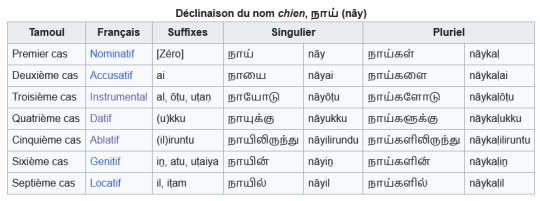
Dr. Schiffman quotes another scholar (Arden 1942) giving 8 cases for modern LT, as in common in "native and missionary grammars", i.e. those written by native Tamil speakers or Christian missionaries. It's the list from above, plus the Vocative case (which is used to address people, think of the KJV Bible's O ye of little faith! for an English vocative)
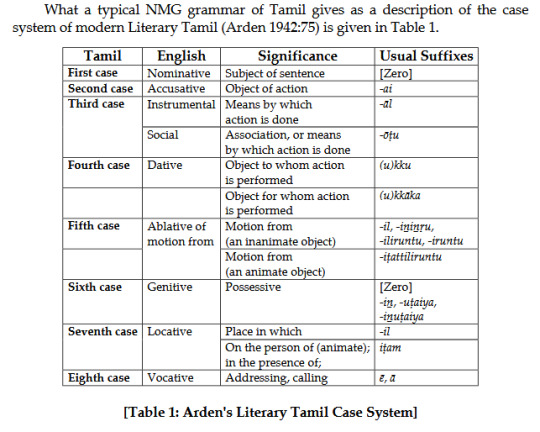
... but hold on, the English wiki for "Tamil grammar" has 10 cases:
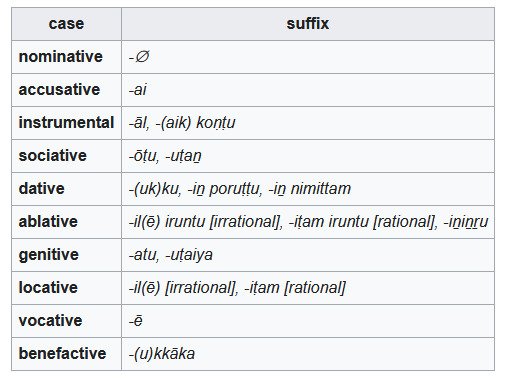
OK, so each page adds a few more. But hold on, why are there multiple suffix entries for each case? Why would you use -otu vs. -utan, or -il vs -ininru vs -ilirintu? How many cases are there actually?
Dr. Schiffman explains why it isn't that easy:
The problem with such a rigid classification is that it fails in a number of important ways ... it is neither an accurate description of the number and shape of the morphemes involved in the system, nor of the syntactic behavior of those morphemes ... It is based on an assumption that there is a clear and unerring way to distinguish between case and postpositional morphemes in the language, when in fact there is no clear distinction.
In other words, Tamil being an agglutinative language, you can stick a bunch of different sounds onto the end of a word, each shifting the meaning, and there is no clear way to call some of those sounds "cases" and other sounds "postpositions".
Schiffman asserts that this system of 7-8 cases was originally developed for Sanskrit (the literary language of North Indian civilizations, of similar antiquity to Tamil, and the liturgical language of Vedic Hinduism) but then tacked onto Tamil post-facto, despite the languages being from completely different families with different grammars.

Schiffman goes through a variety of examples of the incoherence of this model, one of my favorites quoted from Arden 1942 again:

There is no rule as to which ending should be used ... Westerners are apt to use the wrong one. There are no rules but you can still break the rules. Make it make sense!!
Instead of sticking to this system of 7-8 cases which fails the slightest scrutiny, Dr. Schiffman instead proposes that we throw out the whole system and consider every single postposition in the language as a potential case ending:
Having made the claim that there is no clear cut distinction between case and postpositions in Tamil except for the criterion of bound vs. unbound morphology, we are forced to examine all the postpositions as possible candidates for membership in the system. Actually this is probably going too far in the other direction ... since then almost any verb in the language can be advanced to candidacy as a postposition. [!!]
What Schiffman does next is really cool, from a language nerd point of view. He sorts through the various postpositions of the language, and for each area of divergence, uses his understanding of LT and ST to attempt to describe what shades of meaning are being connoted by each suffix. I wouldn't blame you for skipping through this but it is pretty interesting to see him try to figure out the rules behind something that (eg. per Arden 1942) has "no rule".


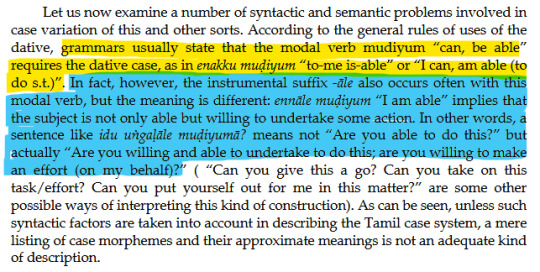
On the "extended dative", which connotates something like "on the behalf of" or "for the sake of":
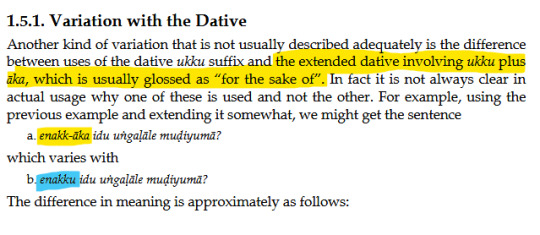

I especially find his analysis of the suffix -kitte fascinating, because Schiffman uncovers a potential case ending in Spoken Tamil that connotes something about the directness or indirectness of an action, separate from the politeness with which the person is speaking to their interlocutor.

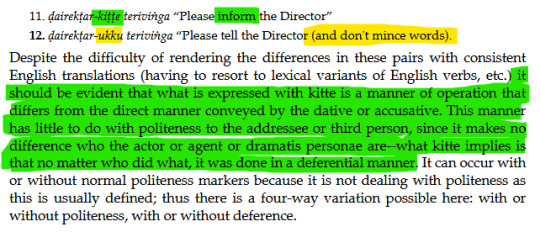
Not to blather on but here's a direct comparison with Finnish, which as stated earlier has 15 cases and not the 7-8 commonly stated of Tamil:
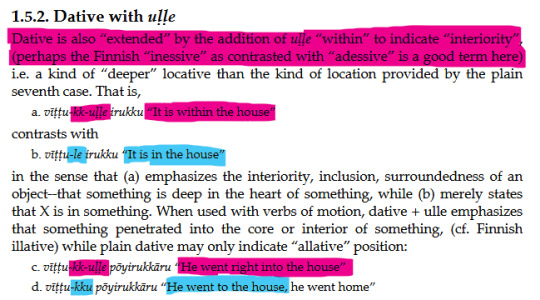
What Schiffman seems to have discovered is that ST, and LT too for that matter, has used existing case endings and in some cases seemingly invented new ones to connote shades of meaning that are lost by the conventional scholar's understanding of Tamil cases. And rather than land on a specific number of cases, he instead says the following, which I find a fascinating concept:
The Tamil Case System is a kind of continuum or polarity, with the “true” case-like morphemes found at one end of the continuum, with less case-like but still bound morphemes next, followed by the commonly recognized postpositions, then finally nominal and verbal expressions that are synonymous with postpositions but not usually recognized as such at the other extreme. This results in a kind of “dendritic” system, with most, but not all, 8 of the basic case nodes capable of being extended in various directions, sometimes overlapping with others, to produce a thicket of branches. The overlap, of course, results from the fact that some postpositions can occur after more than one case, usually with a slight difference in meaning, so that an either-or taxonomy simply does not capture the whole picture.
How many cases does Tamil have? As many as its speakers want, I guess.
158 notes
·
View notes